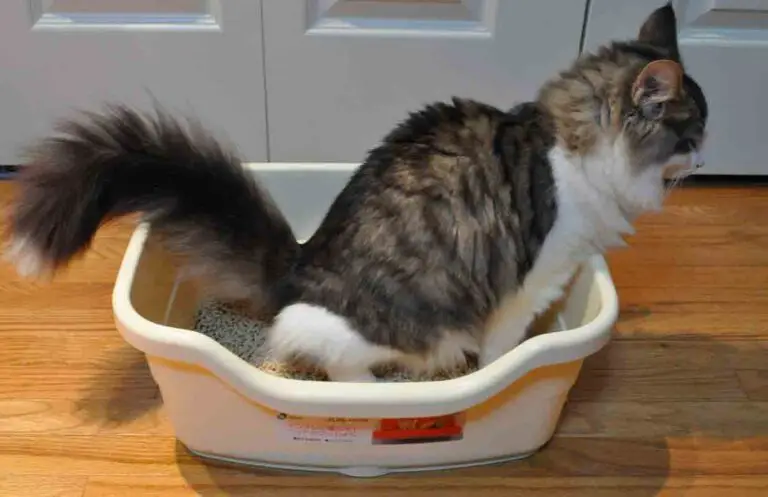One of the most common reasons cats start urinating outside their litter box is because they’re unhappy with the cleanliness of their package. So if you’ve recently changed the type of litter you’re using, that could also be the reason for your cat’s dissatisfaction. In either case, scooping the box more frequently and cleaning it is key to stopping your cat from urinating on the floor.
Another possible reason for your cat’s behavior is stress if there have been any changes in his environment – a new baby, a move to a new house, or even just a change in his routine – that could be causing him stress.
In these cases, it’s essential to provide your cat with plenty of love and attention. Playing with him, petting him, and spending time with him will help reduce his stress levels and may stop him from urinating on the floor.
If you’re still having trouble stopping your cat from urinating on the floor, consult your veterinarian. There could be a medical reason for his behavior, and your vet will be able to provide you with advice on how to solve the problem best.
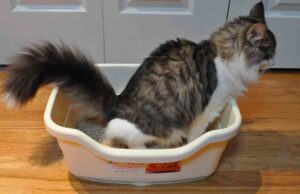
How to Change Your Cat’s Behavior from cat peeing on the floor.
Cleaning cat urine can be challenging if you have multiple feline friends. There are several things you may do to try and prevent your cat from peeing on the floor due to behavioral causes. The following are examples:
Create A Good Daily Schedule
Your cat must have a good daily routine to avoid stress. This includes regular times for meals, playtime, using the litter tray, and sleeping. This will make them learn to pee at the same spot.
Most cat prefers a clean food bowl and does not like strange smells, even their urine smell.
Make Sure The Litter Tray Is Clean
As mentioned above, one of the main reasons cats urinate outside the litter tray is because they’re unhappy with the cleanliness of their box. So make sure to scoop it at least once a day and change the litter thoroughly every week. Always keep the trash clean; a heavily soiled litter tray is not recommended; some cats don’t like a scented litter, deodorants, or disinfectants with strong smells.
Provide Plenty Of Litter Boxes
If you have multiple cats, it’s essential to provide each with its litter box. Having too few litter boxes can cause stress, leading to urinating outside the box. For example, your cat may not like to share the litter tray with her kitty companion. Providing one box for one cat can help you tackle the problem of your cat peeing on the floor.
Cats tend to mark territory; they do not like to share it with new cats in the home.
Avoid Using Punishment
Punishing your cat for urinating on the tile floor will only make him more stressed and likely increase the problem. Instead, focus on providing him with lots of love and attention.
If you’re still having trouble stopping your cat from urinating on the floor, consult your veterinarian. There could be a medical reason for his behavior, and your vet will be able to provide you with advice on how to solve the problem best.
Removing the Scent Will Prevent Its Return
Clean the area where your cat has urinated with a pet-safe enzymatic cleaner to remove the scent. Be sure to follow the instructions on the bottle. If you can’t remove the smell, your cat will continue to return to that spot to urinate.
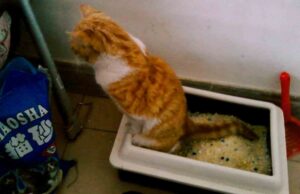
Reasons Why Your Cat Is Peeing in the House
If your cat is peeing in the house, it’s important to figure out why. There are a number of possible reasons, including medical problems, stress, and simply not liking the litter tray. Once you identify the cause, you can take steps to fix the problem. Let’s take a look at them one by one.
Medical Reasons
If your cat is peeing in the house, it’s essential to figure out why. Several possible reasons include medical problems, stress, and simply not liking the litter tray. Once you identify the cause, you can take steps to fix the problem. So let’s take a look at them one by one.
The most common reason for cat incontinence is medical. Your vet should check your cat for these ` to rule them out:
Bladder Stones or Blockage
When a cat pees, it can cause bladder stones or blockages to form in its urinary tract. If your cat goes to the toilet frequently and shows any indications of discomfort (mewing or crying, for example), or if its tummy feels hard when you touch it, there’s a good chance something is blocking one of its urinary organs.
If the urine has traces of blood, then it is likely that your cat is experiencing severe blockage and must be taken to the vet immediately.
A cat with bladder stones may need surgery to remove the stones, and a cat with a blocked bladder may need a catheterization to relieve the obstruction. Prompt treatment is essential to ensure your cat’s health and well-being in either case.
Urinary Tract Infection (UTI)
A urinary tract infection occurs when bacteria enter the urinary tract and cause disease. Cats with UTIs often urinate more frequently and have blood in their urine. If you notice your cat is urinating more frequently, or if its urine has a strong odor or contains blood, take it to the vet right away.
UTIs are treated with antibiotics, and your vet will likely recommend a course of treatment to prevent the infection from returning.
Kidney Disease
Kidney disease is a common problem in older cats and can cause incontinence. For example, if your cat is urinating more frequently than usual, or if its urine contains blood, take it to the vet for an examination.
Feline Interstitial Cystitis
This condition causes inflammation of the bladder and can lead to urinary incontinence. Cats with interstitial cystitis often urinate more frequently and may show discomfort when urinating. If you notice your cat is urinating more frequently than usual, or if it seems to be in pain when using the litter tray.
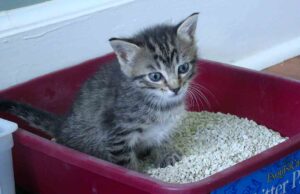
Behavioral Reasons
If you have ruled out the medical conditions by discussing them with a vet, the problem could be behavioral. Some of the reasons for cats peeing on tiles are discussed below.
Litter Box Issues
One of the most common reasons for a cat to urinate outside the litter tray is because it doesn’t like its litter tray. There are several things you can do to make your cat’s litter tray more appealing, including:
- Use a litter box with high sides to give your cat some privacy because the cat feels exposed.
- Adding a litter box mat to help keep the litter box clean
- Adding a litter box cover to help keep the litter box private
- Changing the type of litter you’re using
Sometimes cats mark their territory when they feel threatened.
If your cat pee in the house and is still avoiding its litter box, there could be another issue at play. It could be that your cat doesn’t like the location of its litter tray. If the litter box is in a busy area, try moving it to a more private location. If your cat still isn’t using the litter tray, there could be an underlying medical condition causing the problem.
Stress
Cats can become stressed for a number of reasons, including:
- A change in routine
- A new pet in the house
- Moving to a new home
- The addition of a baby to the family
If you think stress might be the cause of your cat’s incontinence, there are a number of things you can do to help reduce its stress levels, including:
- Provide your cat with a litter box that is private and out of the way
- Adding a cat tree or scratching post to give your cat a place to climb and play
- Giving your cat toys and treats to keep it occupied and amused
- Cats love playing, spending time each day playing with your cat can help her reduce stress
Incontinence is a common problem in cats, but it can be a sign of a serious medical condition. If you notice your cat is urinating more frequently than usual, or if its urine contains blood, take it to the vet for an examination.
Moving to a new home is a big change for your cat, not only do they want to mark their new territory but also want to remove the scent of other cats from the previous homeowner.
Stress
Cats can become stressed for several reasons, including:
- A change in routine
- A new pet in the house
- Moving to a new home
- The addition of a baby to the family
If you think stress might be the cause of your cat’s incontinence, there are several things you can do to help reduce its stress levels, including:
- Provide your cat with a private litter box and out of the way
- Adding a cat tree or scratching post to give your cat a place to climb and play
- Giving your cat toys and treats to keep it occupied and amused
- Cats love playing; spending time each day playing with your cat can help her reduce stress
Incontinence is a common problem in cats, but it can signify a severe medical condition. For example, if you notice your cat is urinating more frequently than usual, or if its urine contains blood, take it to the vet for an examination.
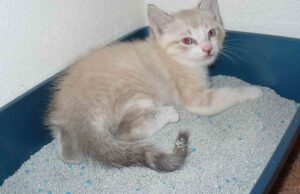
What Not to Do
To help your cat, it’s essential to avoid doing things that could make the problem worse. Here are a few things to avoid as cat owners:
Yelling at your cat or punishing it
It is not a good idea to shout at your cat or punish it if your cat pees on the floor. This will only serve to stress your cat out more, making the problem worse.
Cleaning up with ammonia
Ammonia is a strong-smelling chemical found in some cleaning products. It is also a component of cat urine. Cleaning up your cat’s urine with a product containing ammonia will only make the area more attractive to your cat and could worsen the problem.
Ignoring the problem
If you notice your cat is urinating more frequently than usual, or if its urine contains blood, take it to the vet for an examination. Ignoring the problem could lead to serious health problems for your cat.
Incontinence is a common problem in cats, but it can signify a severe medical condition. If you notice your cat is urinating more frequently than usual, or if its urine contains blood, take it to the vet for an examination.
Changing your cat’s litter box without first consulting with your vet
If you think the problem is with your cat’s litter box, it’s essential to talk to your vet first. They will be able to advise you on the best type of litter box for your cat and can help you troubleshoot any other issues that could be causing the problem.
Final Words:
Have you tried implementing any of these tips to stop your cat from peeing on the floor? If not, what are you waiting for?
Cats are creatures of habit, and if they can predict when their next potty break is, they’re more likely to hold it in until they get there. Creating an excellent daily schedule with plenty of litter boxes will help keep both you and your cat happy and healthy.
FAQ
Are Cats Friends With Other Cats?
It takes most cats an average of eight to 12 months to establish a friendship with a new cat. While some cats do form close friendships, others never do. Many cats that do not become buddies learn to avoid one another, but some continue to fight when introduced and remain at odds until one of the felines is re-homed.
How Do Cats Show Dominance Over Other Cats?
Hissing, striking, and growling are common behaviors among dominant cats in a multi-cat household. They may also urinate outside of the litter box in locations where other cats visit, putting other cats in danger of being pushed out of the meal bowl or feeling threatened.
Is Male Cat Urine Stronger Than Female Cats?
Yes, their urine has a distinctive odor due to certain steroids. They also tend to spray urine as a way of marking their territory. This behavior is more common in unneutered males. Female cats typically do not spray urine.
Can Two Cats Share A Litter Tray?
The golden rule of litterboxes should apply whether you have one or more cats. One litter box for each cat, plus one more, is the optimum number of litter boxes to own. Cats can’t share a litter box for two main reasons: behavioral and health. Giving them separate places to litter can help you reduce the chances of them peeing on the floor.

